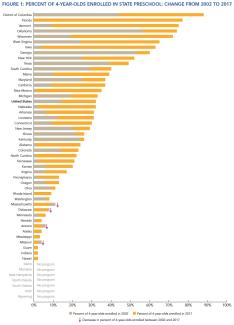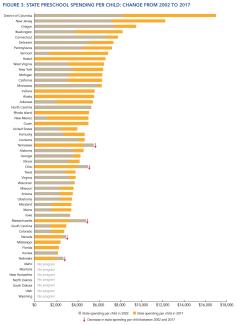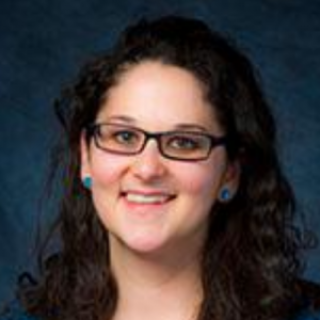
Three Things to Know from ‘The State of Preschool 2017’
April 19, 2018
This week NIEER released its 15th State of Preschool report, providing information on enrollment, spending, and policies related to quality during the 2016-2017 school year for 61 state-funded preschool programs across 43 states, the District of Columbia, and Guam.
The report is a rich source of information on state-funded preschool. This year’s report also features trend data from 2002, when NIEER began tracking state-funded pre-K, through 2017, and a special report on state preschool policies supporting young Dual Language Learners.
To help you get started digesting it, we’ve highlighted three key takeaways from this 2017 report:
Nationally, state spending per child fell since 2015-2016, adjusted for inflation, the first decrease in several years.
State investment in preschool per child enrolled fell in 28 states—nearly two-thirds of those with state-funded preschool. Research suggests that high-quality preschool can have positive, long-lasting impacts on children. But without adequate funding, it is unreasonable to expect that preschool programs can provide the high-quality experiences for children that lead to desired child outcomes.
Few states require preschool staff to have qualifications related to working with preschool Dual Language Learners (DLLs).
Our special report shows only six programs in five states (California Transitional Kindergarten, Illinois, Minnesota Head Start and VPK, Oklahoma, and Texas) require lead teachers to have qualifications related to working with DLLs. Programs in three states with large DLL populations—California TK, Illinois, and Texas—require lead teachers to have a bilingual certification if working with DLLs. Maine requires program administrators to have qualifications related to working with DLLs, but has no requirements for teachers. No states require assistant teachers to have a DLL qualification, which is unfortunate as assistant teachers are more likely to speak the same home language as DLLs.
Surprising trends from 2002 to 2017
Many states have made progress increasing preschool enrollment, funding, and quality. But others regressed or stalled, resulting in increasing inequality across states.
- Unexpected leaders: Several states not typically seen as leaders in state-funded preschool made impressive progress. Vermont, Wisconsin, Iowa, New Mexico, Nebraska, and Arkansas all started small and made big gains. Looking at 4-year-olds enrolled in 2002 and 2017, New Mexico went from 1% to surpass the national average, Vermont went from 9% to 75%, and Iowa went from 4% to nearly 60%.
- States that moved backwards: Four states serve a smaller percent of their state’s 4-year-olds in 2017 than in 2002. Eights state serve a smaller portion of 3-year-olds today. Five states spent less per child on preschool in 2017 than in 2002, even without adjusting for inflation.
Twenty-one states failed to keep up with inflation in spending per child. Six states changed preschool policies to meet fewer of NIEER’s original quality standards benchmarks in 2017 than in 2002. Massachusetts served fewer 3- and 4-year-olds and spent less per child in 2017 than 2002. While this state is often considered a national education leader for K-12, progress for the state’s youngest children is sadly lacking.


For additional information, please see The State of Preschool 2017
Dr. Friedman-Krauss, co-author of The State of Preschool reports, focuses on unpacking impacts of early education interventions, early education quality, and the cognitive and social-emotional development of low-income children. Combining these areas of interest, she has worked on a variety of research projects exploring the bidirectional influences between child behavior problems, classroom quality, and teacher stress in preschool classrooms; the effects of educational instability in children’s cognitive and self-regulation skills; and the relation between poverty-related risk and school readiness. She has also focused on improving measurement of early education quality and its relation to children’s learning in the context of center-based programs.
The Authors
Allison Friedman-Krauss is an Assistant Research Professor at NIEER where she is also the Associate Director for Policy Research and Director of the Infant and Toddler Policy Research Center.
About NIEER
The National Institute for Early Education Research (NIEER) at the Graduate School of Education, Rutgers University, New Brunswick, NJ, conducts and disseminates independent research and analysis to inform early childhood education policy.

